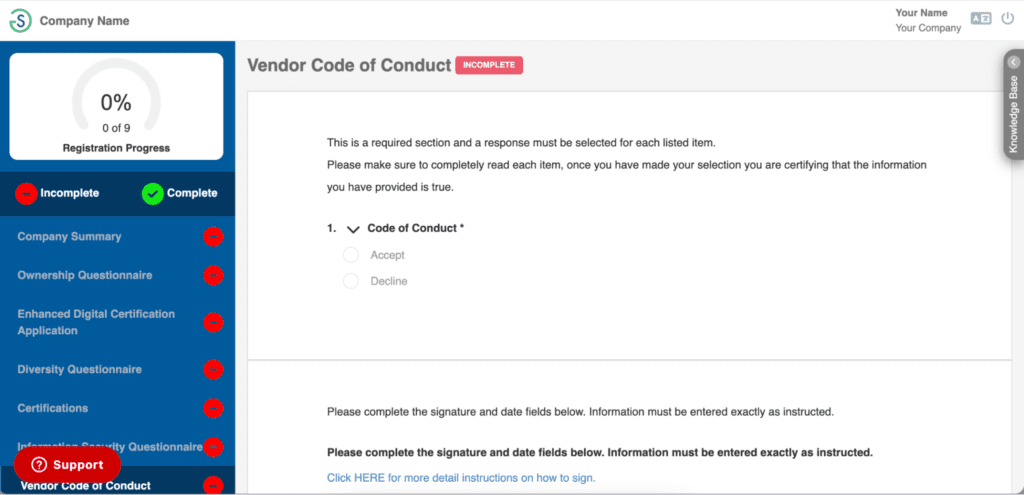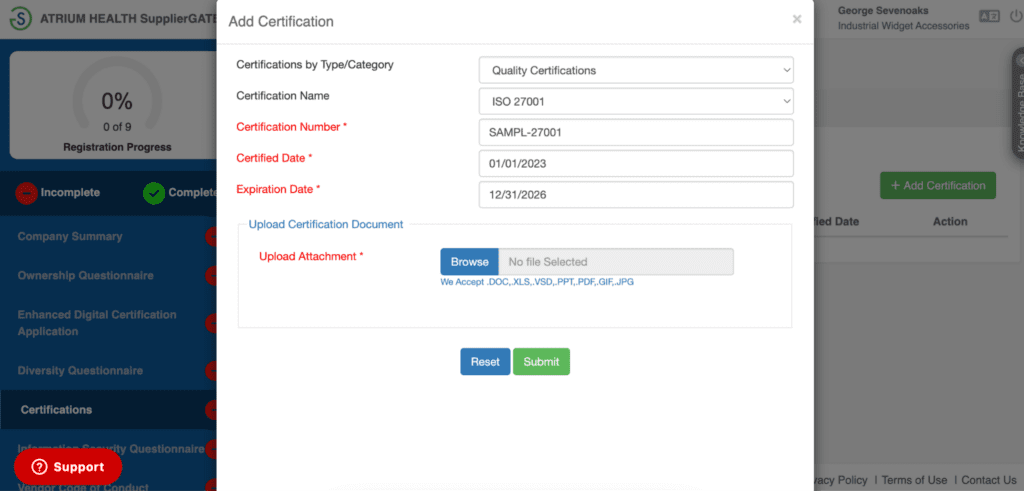Your business relies on goods and services purchased from vendors. Vendors can be any entity that your business purchases a good/service from. This means the folks who sell you notebooks and the corporation that produces specially designed equipment all count as vendors (the plumbers and caterers do, too).
Organizations can work with hundreds and even thousands of vendors, and every single one of them needs to be managed properly. Effectively managing vendors is important for your business. It can mean reducing overall spending, saving money, and making sure orders go smoothly from the time of purchase through to payment. Vendor compliance is one, if not the most important aspect, of vendor management.
What is Compliance for Vendors or Suppliers?
Put simply, vendor compliance management means making sure that all vendors your company does business with adhere to your company’s specific requirements for doing business.
Your company is responsible for setting up and maintaining requirements for vendors that it works with. These requirements mitigate risk, save time and money, and provide prompt resolution should issues arise.
Why is it Important?
The need for effective vendor compliance policies cannot be overstated. Without an effective vendor compliance program, your business has no real way to resolve issues with vendors. If a vendor raises a price, delivers goods late, or delivers an unsatisfactory product, your business has no recourse aside from severing the business relationship.
With a vendor compliance policy or program in place, your business can avoid problems like wrong purchase order numbers, incorrectly filled purchase orders, late deliveries, damaged goods, and more. Any of these issues can ultimately lead to problems with customer service and your organization’s bottom line and reputation.
Can an Effective Vendor Compliance Program Reduce Costs?
Even though all organizations want to save money, compliance policies and programs are often excluded from cost-saving measures. A formal, well-defined vendor management policy that’s used consistently with every vendor can save time and lower all sorts of costs. Increased accuracy and time to market ultimately lead to better customer service and happier customers.
An effective vendor compliance process will also help your organization reduce issues like vendor chargebacks, claims, and disputes. Avoiding these issues leads to better-managed vendor relationships in the long run.

A Vendor Code of Conduct is part of your supplier registration in SupplierGateway’s Onboarding Portal.
Vendor or supplier compliance policies and programs also allow for the implementation of advanced supply chain technologies, like just-in-time inventory, RFID systems, source marketing and ticketing, and ASNs. All of these technologies ultimately create more system efficiencies.
What’s in a Supplier or Vendor Compliance Policy?
Your company’s supplier compliance policy should specify your company’s policies, procedures, expectations, requirements, and penalties regarding but not limited to the following:
- Backorders
- Product condition upon delivery
- Product quality according to specifications
- Delivery dates
- Service standards
- Product packaging and labeling/label-making
- Paperwork requirements
- Customer returns/credits
Your company’s policy should focus its attention on areas that are high priority. For example, if time-to-consumer reductions are important, you’ll want to include clauses regarding expectations for on-time deliveries so that backorders can be reduced. If transportation cost reduction is a challenge, your vendor compliance policy should include inbound routing guides that stress the importance of efficiency.
Promoting supplier compliance can be done in several ways, but chargeback schedules are the most common. Your chargeback schedule will be used to penalize vendors that don’t adhere to compliance policy. Chargeback schedules are often accounted for either through cost per infraction or manpower per hour cost. It should be stressed to your vendors that your company would much rather vendors be compliant than have to charge fees for non-compliance.
It cannot be stressed enough—this document needs to be as clear, precise, and concise as possible. Removing ambiguity helps reduce misunderstandings and confusion.
Build Your Vendor Compliance Program with SupplierGateway
The need for cost-effective, efficient supply chains is greater than ever.
Instituting a vendor compliance program that includes consistent goals and parameters can help standardize your company’s internal processes and achieve significant cost and time reductions. These reductions and savings can give your organization the edge over competitors and ultimately increase your bottom line.
Utilizing supplier risk management software as part of your vendor and supplier compliance program further increases your company’s time and cost savings. Making your vendors accountable for their products, services, and mistakes saves your business money and is critical to your ongoing success.

Simple, streamlined workflows for vendors to add critical data in SupplierGateway’s Onboarding Portal.
SupplierGateway’s Vendor Onboarding Software helps you keep vendors accountable with Supplier Compliance Monitoring tools and a Compliance Document Center.












